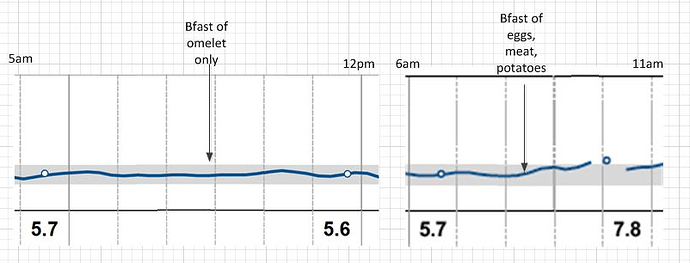I have no scientific proof. The last time I heard it was in an Mikhaila Peterson interview with Ivor Cummings that I watched just a couple of weeks ago. She said that carnivore has done wonders for her health but her mood was actually better on traditional keto. And I remember reading a few similar remarks in social networks, but I don’t remember where.
Actually I meant “There is some dispute on whether we need fiber at all” in the sense that I’ve seen good arguments for both sides, and neither side could fully convince me. And until we know more, I’m not ready to throw out “low fiber” as an issue of the SAD. I remember reading about an analysis of 200+ populations of hunterers and gatherers, and they averaged 15-20 percent carbs. This means they did eat a lot of fiber, as carbs are always coupled with fiber in nature.
I fully agree that we have no clue yet how our gut microbiome changes and what the consequences are. The Inuit and Masai did well on an all-meat diet, but this proves only that we can do well on a no-fiber diet, not that a no-fiber diet is optimal. There clearly are some benefits from feeding our gut bacteria, and we don’t know if they just compensate problems that we wouldn’t have in the first place if we hadn’t switched to a high-carb, high-omega-6 SAD. I’ve read a report about a study (not yet published I think) where MS patients were fed some of those fatty acids produced by gut bacteria, and they improved markedly, much better than with traditional medication. The baseline was a high-carb diet of course…
I’m simply trying to see both sides. There may be a middle ground between “fiber is good” and “fiber is bad”, and it may very well be “some fiber is good for some of us”. I’m pretty certain that serotonin production in the gut is important for sleep and mood, and this may take a hit if we switch to carnivore. Maybe evolutionary it was better to be angry if there were no easy-to-harvest veggies out there, who knows? 
Myself, I have been nearly carnivore for a month now and may end that experiment soon. I started to suffer from severe insomnia again (which is part of my ME/CFS but got much better on keto), and the fact that it’s gradually getting worse indicates that this may not be a transition effect. (Weight loss has stalled too, but weight is only a secondary target and the stalling may be due to muscle buildup. A month is too short to tell anyway.) The only positive change I observed was that my constipation got resolved, as expected (if you know Paul Masons talks on this subject). I’ll give it a few more weeks, but at some points I’d like to see benefits that outweigh the downside. Then I’ll probably cycle back, swich to standard keto for 2-3 months to see how that affects me, and then give carnivore another go.
Things may be different for healthy people vs. sick people. No doubt that healthy people should do great on a carnivore diet, and probably people with specific illnesses (like metabolic syndrome). However, a machine may break in several places, and we have to find and fix what’s broken instead of a one-size-fits-it-all remedy. My guess is carnivore will work great for some people with severe health issues (be it depression or autoimmune diseases), probably for most, but do nothing for others. The potential benefits would suggest that it’s a very good idea to give it a try, but if it doesn’t work then it doesn’t work.
But to conclude: I still think carnivore is great, and I’ll still recommend carnivore as the best elimination diet for all kinds of health issues. But there is a chance that it doesn’t work for all of us.
 I’m traveling a bunch at the start of the year and won’t be able to bring my RMR testing machine with me, but once things settle down I’m happy to help gather some more data on this. I’ll just have to work it around the rest of life.
I’m traveling a bunch at the start of the year and won’t be able to bring my RMR testing machine with me, but once things settle down I’m happy to help gather some more data on this. I’ll just have to work it around the rest of life.





 It’s so incredibly alarmist. Even people who involuntarily starve all the way to death don’t lose much mass at all from their heart. One day of fasting, and are we really supposed to then be in fear for all those important organs?
It’s so incredibly alarmist. Even people who involuntarily starve all the way to death don’t lose much mass at all from their heart. One day of fasting, and are we really supposed to then be in fear for all those important organs?